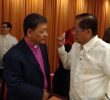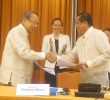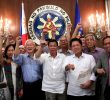
Members of the reciprocal working committees on social and economic reforms from the National Democratic Front of the Philippines and the government sign the ground rules for the conduct of meetings for the negotiations on the Comprehensive Agreement on Social and Economic Reforms on Wednesday morning, Jan. 25, 2017 in Rome, Italy. (Zea Io Ming C. Capistrano/davaotoday.com)
ROME, Italy — Peace panels of the Philippine government and the National Democratic Front signed ground rules on the last day of the six-day peace talks, in the hope to speed up the negotiations on social and economic reforms.
The Comprehensive Agreement on Socio-economic Reforms or CASER is seen to address poverty and give solution to the ongoing armed conflict in the country. The signing of its ground rules is a milestone on the ongoing peace negotiations between the government and the communist movement.
GRP panel member Hernani Braganza said the negotiations on social and economic reforms are complicated.
“The negotiations on social and economic reforms started in 2001 and continued on 2004, after that nothing else happened,” Braganza told Davao Today in an interview.
He said the ground rules would make the meetings more “orderly, efficient and accelerated.”
One of the agreements on the signed ground rules is the formation of bilateral teams by both parties, which may hold meetings in the Philippines.
The meetings could be done in between the formal meetings of the negotiating panels.
“The two parties will make effort not only to hold meetings in the Philippines, but also to harmonize the different positions and submit it to the reciprocal working committee of each Party,” Braganza said.
“In that sense, we will have accelerated negotiations and hopefully approval of the CASER,” he added. Braganza said they are hoping to finish the negotiations on CASER in six months although he admitted that there have already been delays. Braganza said both panels are making adjustments to achieve the target.
For his part, NDFP RWC-SER spokesperson Randall Echanis said they are also expecting to finish the draft CASER within the year.
He said the RWCs of both panels held four working committees since the opening of the third round of talks here.
Echanis said the agreements “already reached on the Preamble and Declaration of Principles, and common ground found in the Bases, Scope and Applicability (Part II) and Desired Outcomes (Part III),” adding that discussions on Agrarian Reform and Rural Development (Part IV) have also already begun.
“Talks on SER comprised the bulk of the working meetings in the third round of the peace negotiations held in Rome,” he said.
Echanis described the NDFP draft as painting “the economic and social suffering of the peasantry and working people in the country.”
“Its premise is that Philippine society is semifeudal and semicolonial and thus needs genuine agrarian reform, national industrialization and a free and independent foreign trade and monetary policy for national development,” he said.
While there has already been some consensus, Echanis said that there are many provisions that will be needing greater discussion and resolution in the course of the negotiations.
“These cover the most important measures for redistributing assets and income, asserting independent foreign economic policy, providing social services and utilities especially for the country’s poor majority, government support for Filipino farms and enterprises, and ensuring democracy in the economy. These are critical,” he said, “for reversing neoliberalism and developing the national economy for the benefit of the people.” (davaotoday.com)









